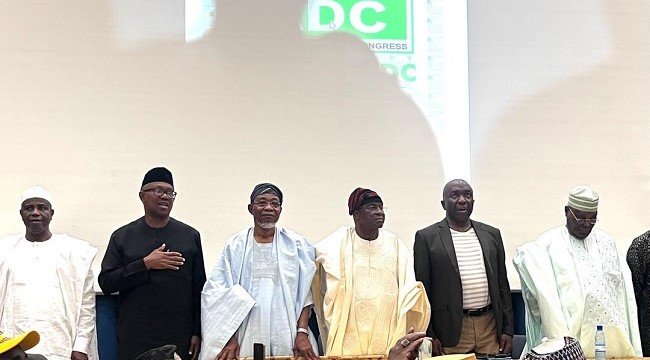THE African Democratic Congress (ADC) is plunged deeper into internal turmoil as the Independent National Electoral Commission (INEC) declines to recognise the party’s newly announced David Mark-led caretaker committee, despite its endorsement by the party’s National Executive Committee (NEC).
The crisis escalated after INEC failed to update its records to reflect the new leadership, maintaining Ralph Okey Nwosu and his executive team as the officially recognised officers on its website. This move, critics say, undermines the legitimacy of the party’s recent leadership changes and highlights a growing rift within the opposition party.
As of Tuesday, INEC’s portal continued to list Ralph Nwosu as the national chairman, alongside other executives such as Said Baba Abdullahi (Secretary) and Mr. Cavin Alagoa (Treasurer), despite their reported resignation. The agency has not publicly acknowledged the leadership change, raising questions about procedural compliance and timing.
INEC’s Chief Press Secretary, Rotimi Lawrence, confirmed to this newspaper that “the old exco is still in charge as of today.”
The NEC’s appointment of former Senate President David Mark as interim chairman, Rauf Aregbesola as national secretary, and Bolaji Abdullahi as publicity secretary has been met with strong resistance from state chapter leaders.
In a joint statement titled “Rejecting the Political Junta by Defending ADC and Nigeria’s Democracy Against Subversion”, state chairmen, under the aegis of “Concerned State Chairmen,” condemned the new committee as an illegitimate attempt to hijack the party.
“This is nothing short of a political coup,” the statement read, signed by forum leader Elias Adokwu and publicity secretary Godwin Alaku. “It’s a blatant and reckless subversion of the ADC constitution and democratic norms.”
The chairmen accused the Mark-led group of engaging in “manipulation, backdoor dealings, and a civilian junta-style takeover,” warning that their actions threaten to fracture the party.
They declared that the ADC is not for sale and urged INEC and law enforcement agencies not to legitimise what they termed an “illegitimate junta.”
Adding a historical perspective, Dr. Chekwas Okorie, founding chairman of the All Progressives Grand Alliance (APGA), supported INEC’s decision to retain Nwosu as chair. Okorie said the MoU between Nwosu and the new leaders lacks legitimacy until formalised through a mini-convention, which he claims is in the works.
“INEC cannot act on a mere memorandum without convention ratification,” Okorie said, dismissing allegations of bias against the electoral commission.
He also cited similar issues within the Labour Party (LP), blaming Nigeria’s judiciary for enabling prolonged crises in political parties through contradictory judgments.
Meanwhile, Labour Party youth leader Kennedy Ahanotu, aligned with the Julius Abure faction, accused INEC of interfering in internal party matters by excluding LP candidates from upcoming by-elections. He said the electoral commission’s actions show bias against the party following its unexpected gains in the 2023 elections.
“INEC is playing hanky-panky with our affairs. This is unconstitutional,” Ahanotu declared in a TV interview, calling for impartiality and respect for internal mechanisms.
Amid the political drama, a coalition of Civil Society Organisations (CSOs) led by Yiaga Africa has written to INEC, demanding an end to premature 2027 campaign activities by political actors. The letter warned that the mounting campaign materials violate Section 92 of the Electoral Act and risk undermining electoral credibility.
“This erosion of legal timelines places undue pressure on the electoral environment and diminishes public trust,” the CSOs stated.







